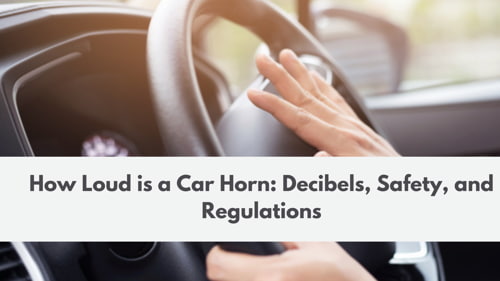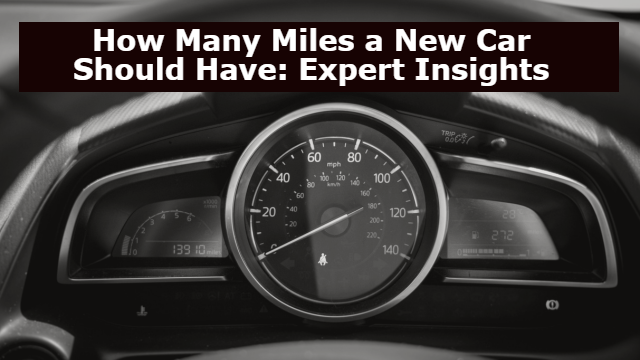How Loud is a Car Horn: Decibels, Safety, and Regulations
Car horns are essential for vehicle safety. They alert other drivers and pedestrians of your presence. These devices produce sound levels comparable to a rock concert. Proper use of car horns helps prevent accidents and improves road safety. Misuse, however, can lead to noise pollution and annoyance.
Understanding the appropriate times to use a car horn is crucial. Always use your car horn responsibly. This ensures safety without causing unnecessary disturbance. Remember, a well-timed honk can save lives. Make sure your car horn is in good working condition. Regular maintenance can help avoid unexpected failures.
Introduction To Car Horn Decibels
Car horns typically produce sound levels ranging from 100 to 110 decibels. This loudness ensures they effectively alert other drivers and pedestrians. Understanding these decibel levels helps recognize vehicle horns’ safety and regulatory standards.
Purpose Of Car Horns
Car horns alert other drivers, signal danger, and communicate in traffic, ensuring safety on the road.
Decibel Levels Explained
A car horn’s sound is measured in decibels (dB). Most car horns range from 100 to 110 decibels. This is similar to the sound of a chainsaw or rock concert. Sounds above 85 dB can cause hearing damage.
Measuring Car Horn Loudness
To measure car horn loudness, use a sound level meter. This tool measures decibels (dB). A smartphone app is another tool, but these apps can be less accurate. Professional sound meters give more precise readings. Always measure from a safe distance. Follow instructions for best results.
Car horns usually range between 100 and 110 decibels, which is quite loud. This is important for safety, as louder horns can be heard in traffic. Always be mindful of local noise regulations.
Safety Implications
Car horns can reach 110 decibels, posing potential hearing risks with prolonged exposure. Drivers should use them judiciously to ensure safety.
Hearing Damage Risks
Car horns are very loud, reaching up to 110 decibels, which is as loud as a rock concert. Loud noises can cause hearing damage, which can happen quickly and be painful. Children are especially at risk, as their ears are more sensitive.
Impact On Pedestrians
Car horns can startle pedestrians. This can cause accidents. People may get scared and jump. Jumping into traffic is dangerous. Loud horns can make people panic. Panic leads to poor decisions. Pedestrians might not hear other sounds. This includes other cars or bikes. It can be very unsafe.

Regulations And Standards
Car horn loudness is regulated to ensure safety and compliance with noise standards. Typically, car horns produce sound levels between 100 and 110 decibels. Regulations help minimize noise pollution while maintaining effective warning signals.
Legal Decibel Limits
Car horns must obey strict laws. Most places set a maximum limit for car horn noise, often around 100 to 110 decibels. Going over this limit can lead to fines. The goal is to avoid hearing damage and reduce noise pollution.
Regional Differences
Different places have different car horn rules. Some countries may allow louder horns, while others may have stricter limits. Always check local laws when driving in new areas. This keeps everyone safe and avoids penalties.
Comparing Car Horns To Other Sounds
A car horn is as loud as a rock concert, reaching up to 110 decibels. This is louder than a lawnmower, which is 90 decibels. A normal conversation is 60 decibels. A car horn is twice as loud as talking. It can be heard over city traffic, and it is very loud to catch attention.
A truck horn is louder than a car horn. Truck horns can be 120 decibels. This is like a thunderclap. Motorcycle horns are quieter. They are around 80 decibels. This is like a busy street. Bicycles have even quieter horns. These are usually 70 decibels. This is like a vacuum cleaner.
Technological Advances
Smart horn systems are making cars safer. These systems use sensors to detect obstacles. Automatic adjustments ensure the horn is only as loud as needed, reducing noise pollution in cities. Some systems even have different sounds for different situations. They can effectively alert pedestrians or other cars. Volume control is another feature. It ensures the horn’s sound level is appropriate. Smart horns are a step toward a quieter environment.
Noise-reduction techniques in car horns are evolving. Materials used in horns can absorb sound, making them less loud. Design changes also help. Engineers are focusing on the horn’s shape, with the goal of directing sound more precisely. Electronic horns are another innovation. These horns can produce a controlled noise level. Frequency modulation is also used, helping to reduce unwanted sounds. These techniques aim to make car horns less disruptive.
Environmental Concerns
Car horns are very loud, reaching up to 110 decibels, which is almost as loud as a rock concert. Loud noises can hurt our ears and make it hard to sleep. Noise pollution can also cause stress. Wildlife can be affected, too. Animals may leave noisy areas, harming their natural habitat.
Use car horns only when needed. This can help reduce noise pollution. Soundproofing materials can be added to cars, making the horn sound less loud outside. Cities can set rules for horn use, limiting noise in quiet areas. Electric cars have quieter horns, making them a better choice for the environment.
Choosing The Right Car Horn
Car horn loudness matters. Consider the decibel level. Higher decibels mean louder horns. Legal limits also exist. Check local laws. Sound type is important. Some horns sound like a beep. Others sound like a honk. Durability counts too. Choose a horn that lasts. Installation ease is also a factor. Some horns are easy to install. Others need professional help. Price is another thing to consider. Some horns are cheap. Others are expensive. Balance cost and quality.
Several brands make good car horns. Hella is a popular brand. Their horns are loud and durable. Fiamm is another good brand. They offer a variety of sounds. Piaa also makes quality horns. They are known for their clear sound. Wolo offers affordable options. Their horns are easy to install. Stebel is famous for its loud horns. Their products are well-made.

Frequently Asked Questions
How Loud Is A Typical Car Horn?
A typical car horn is around 100-110 decibels.
Is 110 Decibels Loud For A Car Horn?
Yes, 110 decibels is quite loud and can be startling.
Can A Car Horn Damage Hearing?
Prolonged exposure to car horns can damage hearing.
How Does Car Horn Volume Vary?
Car horn volume varies based on make and model.
What Affects Car Horn Loudness?
Horn design and vehicle type affect loudness.
Are Car Horns Regulated By Law?
Yes, car horn loudness is regulated by law.
Why Are Car Horns So Loud?
Car horns are loud for safety and alerting purposes.
Conclusion
Understanding the loudness of car horns is crucial for safety and compliance. Car horns typically range from 100 to 110 decibels, which ensures that the sound is heard in noisy environments. Always check local regulations to avoid fines. Stay safe and ensure your car horn is functioning properly.







